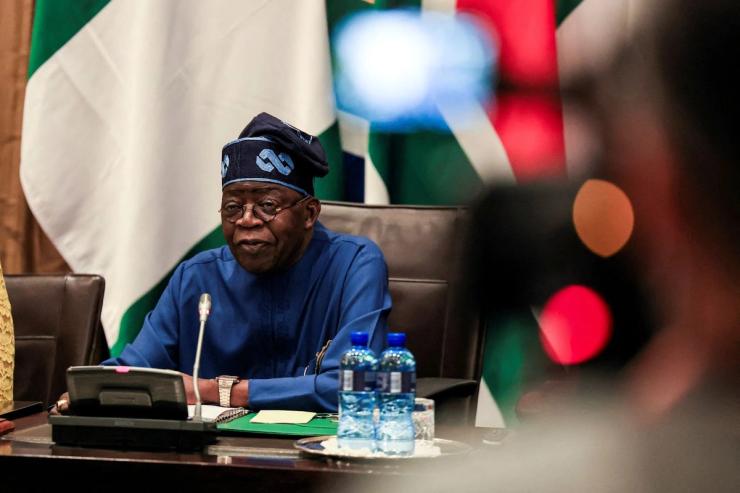The News
The economic policy upheavals that have characterized Nigerian President Bola Tinubu’s two years in power and sparked a deepening cost-of-living crisis are giving way to a less disruptive approach as the leader of Africa’s most populous country prepares for a likely reelection bid in 2027.
Late last week, members of Tinubu’s ruling All Progressives Congress party declared the president their sole candidate for the polls, ahead of his second anniversary on May 29. In Nigeria’s major cities, campaign posters for the 73-year-old hang on street lights alongside massive billboards canvassing “door-to-door” support ahead of elections that are still two years away. And Tinubu’s coalition is already growing: Two opposition governors from large oil-rich southern states defected to the ruling party in recent weeks.
The president’s apparent transition to election campaigning comes as Nigerians grapple with soaring costs of everyday items ever since Tinubu unexpectedly ended fuel subsidies and floated the naira currency upon taking office. The moves aimed to revive one of Africa’s largest economies and improve government efficiency — the subsidies cost Abuja $10 billion in 2022, surpassing the amount spent on health and education combined. But the ensuing five-fold surge in petrol prices and transportation costs raised the price of everything from food and farm feed to construction and rent, fueling anxiety among consumers and businesses.
Tinubu has slowed the shock therapy approach, while initial waves of unrest that saw labor unions threaten to strike have cooled. Nigeria’s inflation rate, calculated with a new formula since January, has steadied contrary to the rapid and steep rise of the first year. The central bank reshaped by Tinubu now generally holds the benchmark interest rate, after cranking it up multiple times last year.
In this article:
Know More
More than half of Nigeria’s 220 million inhabitants are classified as being in “severe poverty,” with PricewaterhouseCoopers projecting that 13 million more could fall below the poverty line this year as a result of Tinubu’s policy overhaul of the last two years.
But Nigeria’s 3.4% growth last year showed an improved fiscal position, the World Bank said this month, noting that revenues rose from 7% of gross domestic product in 2023 to nearly 12% in 2024 — even as the government reduced its fiscal deficit by more than two percentage points. The metrics underscore the country’s “impressive strides to restore macroeconomic stability,” the bank said.
Growth in government revenues and expenditure over the past year show that the policy changes “were necessary,” said Bismarck Rewane, an economist and chief executive of the Lagos-based firm Financial Derivatives.
Credit rating agencies have issued or maintained a ‘stable’ outlook for Nigeria, banking on the government to sustain its policy agenda which has largely been endorsed by Bretton Woods institutions. In April, Fitch Ratings upgraded its score for the country, praising it for “improved policy coherence and credibility and reduced economic distortions.” S&P said this month that it expects Nigeria to grow its foreign exchange reserves — which stood at $23 billion at the end of last year, per the central bank — though reforms will slow and their potency may yet be challenged by a global fall in oil prices.
Alexander’s view
Tinubu inherited an economy that had struggled through two recessions, overseen by an ex-military dictator who defended import restrictions and multiple exchange rates fixed by the central bank. Resetting from that baseline has seen Tinubu aggressively impose his will, helped by a class of faithful lieutenants he cultivated over decades as Nigeria’s pre-eminent political kingmaker.
Weak, nearly non-existent political opposition places Tinubu in good stead to retain his role in two years’ time, though there is now a scramble by some groups and disgruntled former allies of the president to form a coalition.
On Tuesday, a few hundred supporters lined a street close to the domestic airport in Lagos to cheer him at an event commemorating the 50th anniversary of the West African bloc Ecowas. I found it a bit bizarre since the demographic of the crowd — mothers, young men, middle-aged men — mirror the wider population who complain that the rapid changes of the last two years have increased the cost of living. Nigeria is home to 19% of the poorest people in sub-Saharan Africa, the largest share of any country in the region.
Yet, experts ultimately see the high cost of Tinubu’s changes as “a necessary trade-off,” as Samuel Aladegbaye, a financial markets analyst at Zedcrest Group in Lagos, told me. He points to a now decentralized power generation and distribution system — thanks to a new law Tinubu signed in 2023 — as “a bold step toward fixing a long broken system.”
Tinubu’s next big push — gradually reforming the tax code to boost revenues — seems headed for success, Rewane told me, though “companies have to be profitable to be taxable.”
Tax reform provides a window to “transform Nigeria’s feeding bottle federalism” — in which most states function by depending on monthly shares of national revenues — into a system where they depend more on themselves, said Afolabi Adekaiyaoja, a research fellow at the UK’s International Centre for Tax and Development. It doubles as a politically savvy move that “makes Tinubu immune to the whims and ambitions of the nation’s powerful state governors,” virtually ensuring his reelection in 2027, Adekaiyaoja told me.
Room for Disagreement
Nigeria’s economy has halved to under $200 billion since Tinubu took the reins, according to the World Bank. It is a fact that runs counter to the narrative of improved performance over the last two years, said Wilson Erumebor, an economist at the Nigeria Economic Summit Group, a private sector think tank.
“You can certainly say that this is not progress,” considering Tinubu’s ambition to make Nigeria a trillion-dollar economy by 2030, Erumebor said. “It is worse off than when the government came in.”
Notable
- Tinubu’s “handling of security has not seen any improvements” two years into his tenure, the French news agency AFP reported in its assessment of his tenure.


